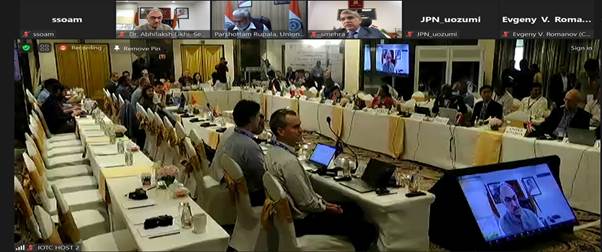New Delhi,4th December: “The Scientific Committee, as the advisory body to the Commission, plays an instrumental role in shaping policies for data collection, processing, and analysis. Its responsibility of assessing and reporting on tuna stocks is paramount.” Union Minister for Fisheries, Animal Husbandry & Dairying Shri Parshottam Rupala stated this in his virtual address to the concluding session of 19th Working Party on Data Collection and Statistics (WPDCS19) of the Indian Ocean Tuna Commission (IOTC) today. WPDCS19 of IOTC was organized at Mumbai, Maharashtra by the Department of Fisheries, Ministry of Fisheries, Animal Husbandry & Dairying. MoS for Fisheries, AHD & IB Dr L. Murugan, Fisheries Minister of Govt of Maharashtra Shri Sudhir Mungantiwar, Executive Secretary of the IOTC Dr Paul de Bruyn; Chairperson of the IOTC Scientific Committee Dr. Toshihide Kitakado (Japan), Joint Secretary (Marine Fisheries), DoF Ms. Neetu Kumari Prasad, Secretary & Commissioner of Fisheries, Govt of Maharashtra Dr. Atul Patne, Managing Director, Maharashtra Fishery Development Corporation Shri Pankaj Kumar, Monitoring & Evaluation Officer from FAO HQ. Ms. Kathrin Hett, Heads of Delegations were also present on the occasion in person or virtually.

Union Minister Shri Parshottam Rupala said that while we commend the Committee’s efficiency, it is disconcerting to witness a significant increase in catches, particularly of yellowfin and bigeye, leading to overfishing concerns despite our science-based conservation and management efforts. He said that Tunas and pelagic species are not merely marine resources; they are economic lifelines, contributing $41 billion annually. The scale of their international impact demands collaborative efforts for effective management, especially as they face threats from overfishing by multinational fleets.
Union Minister for FAH&D said that India strongly believes that the outcome of this Scientific Committee meeting will provide a level playing field to address the concerns and aspirations of traditional tuna fishers and their livelihoods. We urge for a balanced approach that considers the unique challenges faced by artisanal and small-scale fishing communities. He said that pollution and climate change also are contributing to the sad state of Indian Ocean fishery resources.
Shri Rupala said that in recent years, the surge in industrial fishing has posed challenges to the sustainability of Indian Ocean tropical tuna stocks. It is crucial to recognize the substantial efforts India has made towards sustainable fisheries management. Our traditional and small-scale tuna fisheries sector has long been intertwined with the ethos of sustainability. He said that India’s tuna fishing capacity in the IOTC area is among the lowest, and we are not a distant water-fishing nation. Unlike some advanced fishing CPCs, India operates with modest-sized fleets that primarily fish within its Exclusive Economic Zone (EEZ), employing passive gear and leaving minimal environmental footprints.

Union Minister said that our commitment to sustainability is reflected in the practices of our traditional fishers, who voluntarily refrain from fishing for 61 days each year to allow fish to grow and regenerate. This demonstrates a deep understanding of the delicate balance required for sustainable fisheries. He said that it is noteworthy that India’s engagement in the sustainable harnessing of its tuna and tuna-like resources has been exemplary. The recent surge in industrial fishing by some nations has raised concerns globally. While many nations allowed their gigantic industrial fleets to exploit and deplete the Indian Ocean’s tuna wealth, India maintained fleets of modest size, operating with passive gear and leaving minimal footprints in the seascape. Shri Rupala further added that the impact of advanced fishing nations on global tuna stocks, especially in the high seas, is undeniable. Recent research indicates that high seas fisheries, in their current scale, heavily rely on large government subsidies. India reiterates its position that advanced fishing nations must take responsibility for the damage caused to the Indian Ocean tuna stocks.
Shri Parshottam Rupala emphasised that during the 26th UN Climate Change Conference of the Parties (COP26) held in Glasgow, Prime Minister Shri Narendra Modi called for Mission LiFE, which is a public movement to mobilize individuals to become ‘Pro-Planet People’. Mission LiFE can become a mass movement of Environmental Conscious Lifestyle. PM added, what is needed today is Mindful and Deliberate Utilisation, instead of Mindless and Destructive Consumption. During the COP28 summit recently concluded at Dubai, PM Narendra Modi called for maintaining a balance between mitigation and adaptation and called for “just and inclusive” energy transition across the world. He called on rich countries to “rise above self-interest” and transfer technology to help developing nations combat climate change. Unless world leaders, governments, businesses and individuals take bold steps to reduce the immense pressure exerted on nature, efforts to address the marine pollution and climate change crisis and achieve the Sustainable Development Goals will fail. In fact, investing in nature isn’t a departure from other kinds of development; investing in nature is critical for development and a sustainable future. Minister said we anticipated that the scientific advice provided by the IOTC Scientific Committee will pave the way for large industrial fleets to align with management targets, combating the ill effects of climate change, ensuring the sustenance of coastal communities, the development of Indian Ocean coastal states, and the protection of our precious marine resources.
Delegates and Representatives of the IOTC Member countries, Scientists and Experts from the member countries and from various Scientific Institutions in the world, Observers of the IOTC, Officers of the State Govt of Maharashtra were also present on the occasion.

Comments are closed.